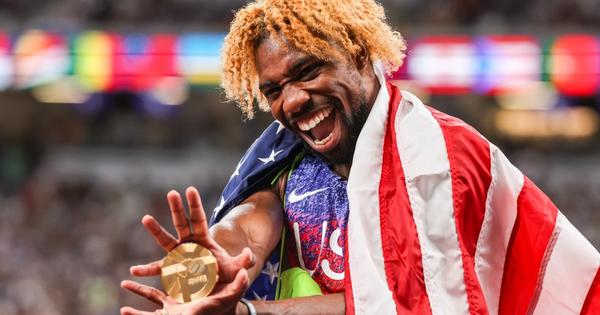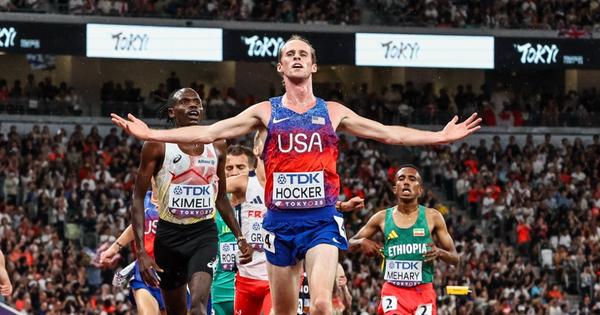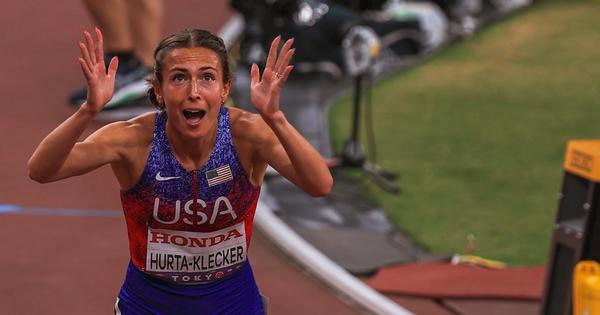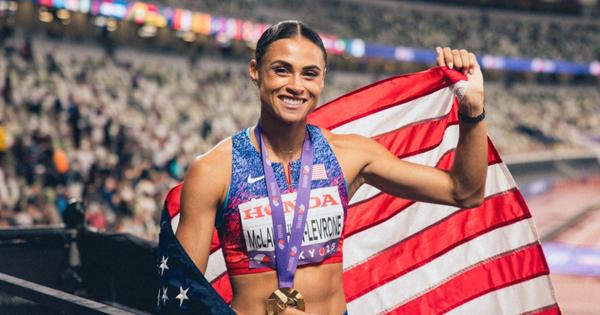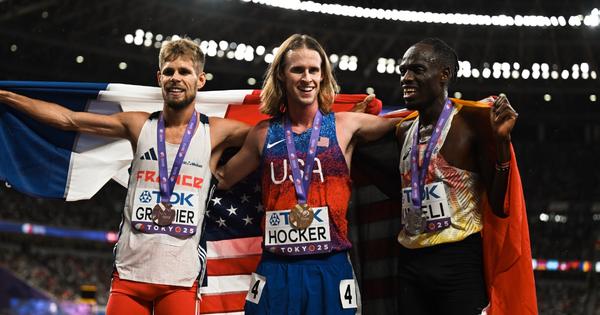By David Melly
October 1, 2025
In most sports, the entire arc of a season bends toward an ultimate conclusion: determining who’s the indisputable best at their chosen craft. In a few short weeks, a World Series champion will be crowned, rendering the 162 regular-season baseball games that preceded it a big blurry prelude to the games that Really Matter.
For years, we’ve wrestled with the outsize importance that the Olympics and World Championships have over track and field. You’ve heard the arguments over and over: it’s great for every narrative to come to a head in one big, final clash, but it’s frustrating when the championship overshadows or negates the value of regular-season racing. The 2025 reality is, however much we want the regular season to matter, winning global [outdoor] gold is generally considered the final stamp on world #1 status.
Sometimes, there’s no ambiguity to quibble over. Who can argue that Mondo Duplantis or Valarie Allman wasn’t the best in the world at their discipline this year? Along with Duplantis and Allman, who went undefeated all season, there were seven other athletes who claimed the trifecta of World gold, a win at the Diamond League final, and the best mark in their event this year: Noah Lyles (200m), Emmanuel Wanyonyi (800m), Cordell Tinch (110m hurdles), Hamish Kerr (high jump), Femke Bol (400m hurdles), and Leyanis Perez Hernandez (triple jump).
All of those athletes—with the possible exception of Bol, who inarguably benefited from Sydney McLaughlin-Levrone’s late-season focus on the flat 400m—can fairly credibly claim world #1 status. A few others didn’t quite three-for-three but still have unassailable cases: Tara Davis-Woodhall and Melissa Jefferson-Wooden ran the table in their domains but skipped the DL final; Ethan Katzberg and Camryn Rogers dominated the hammer, but the much-maligned throwing event has been excluded from the Diamond League for years.
Others may not have the list of results to climb the World Athletics rankings, but their Tokyo performance still serves as a shiny round “told-ya-so.” Per WA, McLaughlin-Levrone is the third-ranked 400m runner this year behind Marileidy Paulino and Salwa Eid Naser, and if you’re a hard-core Diamond League and/or Grand Slam truther, you’d be happy to see Sydney placed behind her oft-racing rivals. But that simply doesn’t pass the smell test: the now-second-fastest woman of all time beat Paulino and Naser in stunning fashion at Worlds, and it’s hard to argue against her status as best in the world at her new event.
Ryan Crouser isn’t even ranked by World Athletics because he competed exactly once in 2025, but despite battling an elbow injury all season, the world record holder in the shot put still came home with his fifth straight global gold. Heck, you could even make the case that his “world #1” status is solidified by the sparse nature of his season: the guy was hurt all year, didn’t get his competition reps in, and still embarrassed everyone who’d been firing on all cylinders for months.
But the most interesting events are the ones where, perhaps, the gold medalist wasn’t the consensus best athlete. Does Lilian Odira’s meteoric rise to the top of the 800m outweigh a season where she only raced outside Kenya once? Does Jimmy Gressier’s prodigious kicking ability really mean he’s the best 10,000m runner in the world? Conversely, is Mykolas Alekna’s continued inability to land atop a discus podium outweighed by his multiple world records?
In four track events, the Diamond League winner, world leader, and World champion were three different people this year. Let’s go through them one by one, to try and make sense of these cases.
Women’s 100m hurdles: Masai Russell is the world leader at 12.17 and, for whatever it’s still worth, the reigning Olympic champion. Ackera Nugent won the Diamond League final. Ditaji Kambundji shocked the world with a huge PB to win gold in Tokyo. And Grace Stark is currently ranked #1 by World Athletics, despite finishing third in both the DL final and Worlds. So who’s the best hurdler in the world this year?
At the risk of being accused of American bias for the umpteenth time, we’re going with Russell here. She underperformed in Tokyo, finishing fourth, but she did win the U.S. championships, run under 12.20 twice this year, and win the 60m hurdles at the U.S. Indoor champs (she skipped World Indoors). Russell needs to work on her consistency, but the heights of her highs were better than anyone else’s.
Men’s 3000m steeplechase: Geordie Beamish won a slow-as-molasses World final with a scintillating kick, dethroning four-time defending World/Olympic champ Soufiane El Bakkali in the process. Frederik Ruppert won the Diamond League final but finished a well-beaten twelfth in the Tokyo race. This one likely comes down to a choice between Beamish and El Bakkali, the latter of whom is the world leader at 8:00.70 and the former of whom has a season’s best of 8:13.86.
Neither man has raced that much this year, with Beamish racing two steeples before Worlds and El Bakkali three. The boring answer would be to say that, despite a blemish on his otherwise pristine championship record, El Bakkali is still the man to beat. But there’s a real argument to be made that Beamish taking down El Bakkali in a championship for the first time since 2019 is a serious achievement.
Men’s 1500m: You’re probably tired of hearing us wax lyrical on this event. But “Isaac Nader, world #1” feels weird to say out loud. Does Cole Hocker deserve some transitive credit for winning the 5000m because he didn’t have the chance to do the same in the 1500m? Does Josh Kerr get consideration for his ill-timed injury? Or Phanuel Koech for his fall? Heck, do we give this one to Jakob Ingebrigtsen for his indoor mile world record back in February?
Niels Laros has the most high-profile wins over top competition, including the Diamond League final and the Prefontaine Classic. But he was only fifth at Worlds. None of the four men who beat him—Nader, Jake Wightman, Reynold Cheruiyot, and Timothy Cheruiyot—have a resume that conspicuously outshines Laros’s. So here, we’ll give a little deference to World Athletics’s ranking system: their algorithm says that Nader’s wins at Worlds and the Oslo Dream Mile, plus a trio of high-profile top-three finishes slightly outweighs Laros’s three DL wins and Worlds finish.
Which brings us to the most controversial call of all… the “fastest man alive” conversation.
Men’s 100m: The World champ, world leader, U.S. champ, DL champ, and top American at Worlds were five different men: Oblique Seville, Kishane Thompson, Kenny Bednarek, Christian Coleman, and Noah Lyles. Coleman’s victory in Zurich was largely the product of no one else showing up, so we’ll knock him out of the conversation. Kung Fu Kenny deserves credit for going three for three at Grand Slam and winning USAs, but the second half of his season was less impressive and he lost to both Thompson and Lyles, twice. Lyles, the Olympic champ, could make the case that his world-leading 200m adds to his overall case, but that’s never how we as a culture have determined this mantle.
So it’s down to Seville vs. Thompson (See? Not so America-biased after all!). Head-to-head, Thompson beat Seville twice in three attempts, but Seville won when it counted most, in the World final. Thompson had to settle for silver for the second year in a row, but he’s the world leader at 9.75. In addition to running faster than anyone else, he went six for eight in 100m wins (Seville went three for eight), beat the World champ twice including at their national championships, and beat the Olympic champ head-to-head twice this season. At the risk of stirring up controversy, Kishane Thompson is our fastest man alive this year.
The reality is that, short of setting a world record, people will remember your 2025 season primarily by your finish at the championship at the end. Worlds never quite tells the full story, however, and some of the kookier results from Tokyo underscored the limitations of measuring off medals. World Athletics’s rankings and end-of-season awards try to take more of a holistic view, but ultimately there’s no one answer and every fan has a slightly different opinion. And the ability to reflect, debate, and disagree is what the postseason is all about.

David Melly
David began contributing to CITIUS in 2018, and quickly cemented himself as an integral part of the team thanks to his quick wit, hot takes, undying love for the sport and willingness to get yelled at online.
